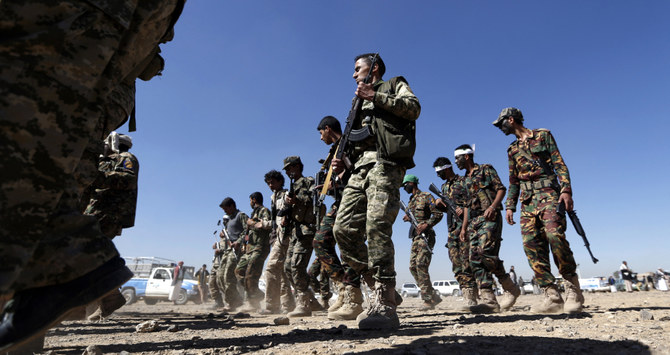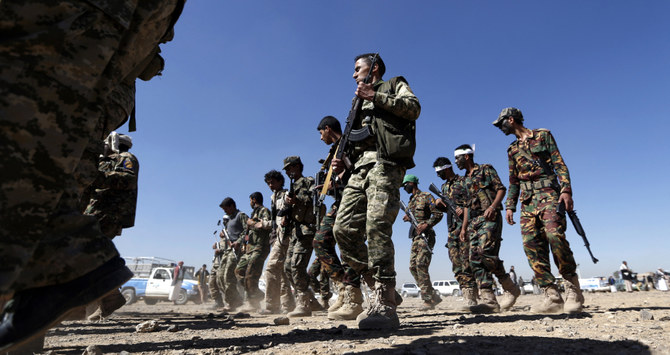NEW YORK CITY: Saudi Arabia on Thursday called for the Iran-backed Houthi militia in Yemen to be officially designated as a terrorist group, for it to face an international boycott, and for its funding sources to be blocked.
While reiterating its commitment to the international efforts to end the war in Yemen, the Kingdom also said it reserves the right to defend itself should the militia resume attacks on Saudi targets.
“We will spare no effort to deter these hostile acts against us,” Abdulaziz Al-Wasil, the Kingdom’s permanent representative to the UN, said during a Security Council meeting to discuss the latest developments in the war-ravaged country.
A truce, which had been in place since April and was extended twice, expired on Oct. 2 despite intensive diplomatic efforts to renew and expand the agreement.
The failure to extend the ceasefire was blamed on what council members described as “additional maximalist demands” on the part of the Houthis that could not be met.
The latest proposal that Hans Grundberg, the UN’s special envoy for Yemen, submitted to all parties before the truce expired included a six-month renewal period, the payment of salaries and pensions to civil servants, the reopening of certain roads in Taiz and other governorates, the addition of more destinations for flights from Sanaa airport, the unhindered entry of fuel ships to Hodeidah port, a commitment to the release of detainees as a matter of urgency, and the strengthening of deescalation mechanisms through the auspices of the Military Coordination Committee.
The longer renewal period of six months, compared with the previous two-month extensions, was designed to provide time for negotiations to begin on an indefinite ceasefire, the resumption of an inclusive political process, and wider economic issues.
“I appreciate the position of the Government of Yemen on engaging positively with my proposal and I regret that Ansar Allah (the official name for the Houthis) came up with additional demands that could not be met,” said Grundberg.
He urged all parties to “demonstrate the leadership and flexibility required to reach an extended and expanded agreement.”
Reiterating his “appreciation for the continued steadfast support” of the Security Council, as well as that of Saudi Arabia and Oman, Grundberg said that the achievements and benefits of the truce should not be underestimated.
Implemented after eight years of conflict, he said, the truce had brought the longest period of calm yet to Yemen, during which there had been no major military operations and a 60 percent decrease in civilian casualties.
It also meant that Sanaa airport was able to reopen, allowing more than 27,000 people to travel abroad for medical attention, education or business. In addition, more than 1.4 million tons of fuel were delivered to Hodeidah’s port during the period of the truce, more than three times the amount that arrived during the whole of 2021.
Face-to-face meetings, under the auspices of the UN, of the parties involved in the conflict also took place to discuss military de-escalation and the reopening of roads in Taiz and other governorates.
Ambassador Al-Wasil told the Security Council: “We have all borne witness on Oct. 2 to the rejection by the Houthi militia of (Grundberg’s) proposal.
“This rejection was no surprise for those who are aware of the nature of this extremist terrorist militia that has taken the Yemeni people hostage, is controlling their fate and exposing entire Yemeni generations to the risks of war and armed conflict, putting at the forefront their extremist ideological interests.
“Hence the threats to peace and stability in the region and Yemen continue and hamper a peaceful settlement (there).”
The Saudi envoy said a group that is rejecting a peace proposal, hampering international efforts to repair the stricken Safer oil tanker that threatens to cause an unprecedented environmental disaster in the Red Sea, laying mines and trafficking illegal weapons, confiscating shipments of humanitarian supplies, and targeting the infrastructures of neighboring states through drone attacks “is not a peaceful group and does not care about the suffering of the Yemeni people. This is a terrorist group under the terms of the Security Council Resolution 2624.”
He added: “Although the proposals to extend the truce might in some way be partially in favor of the Houthis, the Security Council accepted them for the Yemeni people. The international community welcomed this step forward. My country has also supported the efforts of the special envoy to achieve the truce — with other countries and members of the coalition, the United States, the UK and other countries — all to achieve a comprehensive political agreement solution in Yemen.
“But let us recall that the Houthi militia had already violated the truce on several occasions. They refused to put the revenue from oil tankers in the special account to pay civil servants’ salaries. They also organized military parades in Hodeidah, which is a flagrant violation of the Stockholm agreement. It also continues to besiege Taiz.
“So as we have run out of efforts — the Houthi militia are rejecting any efforts to achieve a peaceful settlement, (they) are insisting on defying the cause for peace and stability in Yemen — it falls to the international community, and the Security Council in particular, to reassess this extremist group that is taking the future of Yemen hostage.”
Richard Mills, the US deputy permanent representative to the UN, said “It is our responsibility as the Security Council to be clear, clear about why Yemen has diverted from the path to peace: It is because of the actions of the Houthis, who failed to accept the UN truce proposal and whose inflammatory threats to commercial enterprises are an offense to the entire international community.
“It is the Houthis who must take action to prevent further suffering and enable even greater benefits for Yemenis under an expanded truce agreement. They have a moral responsibility not to deprive Yemenis of these benefits, including salary payments for nurses and teachers and tens of thousands of other civil servants who have not been paid in years.”
As he expressed appreciation for the “commitments of the Yemeni Government and Saudi Arabia to maintain the terms of the truce and to exercise restraint during this sensitive period,” the American envoy implored the Houthis to do the same.
Mills also praised “the strong commitment of regional partners such as Oman, Saudi Arabia and others to ending the devastating cycle of destruction in Yemen and to bring in new opportunities to that country.”
He urged the Houthis to “cease rhetoric threatening commercial shipping and oil companies in the region. Such threats are unacceptable and even a small incident or provocation could have an outsized impact on Yemen’s future.”
He called on the Houthis to face up to the “historic decision” they need to make, describing it as “one that will be remembered for generations to come: Did they, when they had the chance, choose peace and prosperity for their people or did they choose to continue a cycle of pointless destruction, relentless violence and economic deprivation that has plagued Yemen for the last eight years?”


















